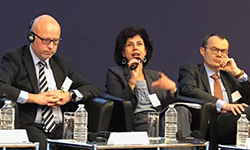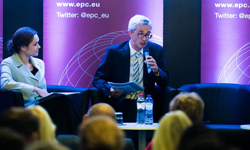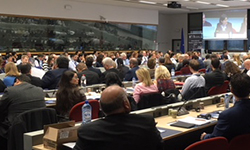BusinessEurope Headlines No. 2018-36
European business community should join forces to enable future growth and prosperity

“In times of rising global uncertainty and pressure it is crucial that the European business community stands up for our common European values and works together to enable also future growth and prosperity across Europe. The cooperation and dialogue between BDI and Confindustria is a leading example for this”, BusinessEurope President Pierre Gattaz stressed during his intervention at the 8th BDI - Confindustria Business Forum, organised by the two BusinessEurope member organisations (in Germany and Italy) in Bozen-Bolzano on 8 November 2018. The Italian Minister for Foreign Affairs Enzo Moavero Milanesi, and the Presidents of BDI, Dieter Kempf, and Confindustria, Vincenzo Boccia, were also present. At the end of the meeting Confindustria and BDI presented a common vision on the “Future of Europe” and signed a joint declaration.
![]()
![]() Contact: Daniele Olivieri
Contact: Daniele Olivieri
Video message on Horizon Europe research and innovation programme
Horizon Europe is the European Commission research and innovation funding programme that will succeed Horizon 2020. See why this new programme is so important for EU companies success.
Our comment
Horizon Europe: missions & partnerships are key to innovation – and so to citizens’ future
By Carolina Vigo, Adviser for Research and Innovation
 Governments are at the forefront to address today’s challenges: their first role is to protect citizens and deliver results. At the same time, together with the public sector, companies provide creative and innovative solutions in addressing these challenges. How so? Businesses contribute with more than half of the EU investments allocated to research and innovation (R&I) – which is key to tackle the societal challenges of our time.
Governments are at the forefront to address today’s challenges: their first role is to protect citizens and deliver results. At the same time, together with the public sector, companies provide creative and innovative solutions in addressing these challenges. How so? Businesses contribute with more than half of the EU investments allocated to research and innovation (R&I) – which is key to tackle the societal challenges of our time.
Despite the intrinsic added-values of R&I funds and activities, both the EU and its Member States are still far from reaching the agreed 3% target of GDP invested in R&I. How to change the situation?
If well designed, the 9th Framework Programme for R&I, the so-called Horizon Europe, presented last June by the European Commission, will be a step forward in that direction. The programme introduced new features, including missions to promote research results and new forms of public-private partnerships (PPPs). Both tools are aimed to develop cooperation synergies with other players, leverage further investments, support the EU’s competitiveness and ultimately tackle societal challenges.
The business community supports the proposed missions-approach, as it can positively harness the directionality of innovation and the power of R&I to achieve wider social and policy aims as well as economic goals. Setting R&I missions will help the EU deliver on its strategic policy priorities and facilitate ensuring the innovation principle implementation.
Similarly, businesses consider that PPPs have already showed their positive results: partnerships allow companies along the value chain to work together leading to better project outputs. As an example, CleanSky2 or Bio-Based Industry partnerships have positively linked activities across the innovation cycle and helped overcome fragmentation in their respective sectors by creating long-lasting pre-competitive collaborative networks that bring together previously unrelated actors.
Is everything perfect? Of course not, the challenges are big and cannot be solved with two single instruments. However, what missions and partnerships show is that there is a clear potential that is not fully exploited.
Strictly defining the missions or even capping the budget allocated to partnerships can be detrimental for developing innovative solutions. These measures can limit the beneficial effects of these instruments which are expected to achieve policy objectives that the Framework Programme alone cannot attain: missions will provide an approach to R&I and partnerships can foster cooperation to boost innovation. Instead of proposing new limits, discussions shall aim to clarify the framework of these two instruments so to fully take advantage of their potentials.
Governments and companies have to collaborate in order to address the huge societal challenges of today. To tackle these problems and achieve a higher level of ambition, an efficient R&I framework is key. Horizon Europe is an excellent opportunity to deepen EU’s innovation capability and develop creative solutions for a better future.
Contact: Carolina Vigo
Exchange of views on the European patent landscape
 The new President of the European Patent Office (EPO) in Munich, António Campinos, visited BusinessEurope and attended its Patents Working Group meeting on 12 November. The EPO is one of the biggest patent offices in the world having granted more than 160.000 patents in 2017 with an expected growth this year of 4%. BusinessEurope had the opportunity to exchange views on the future challenges (e.g. use of digital tools for patent procedures as well as patenting of artificial intelligence technology) of the European patent landscape as well as on ongoing cooperation of the business community with the European Patent Office.
The new President of the European Patent Office (EPO) in Munich, António Campinos, visited BusinessEurope and attended its Patents Working Group meeting on 12 November. The EPO is one of the biggest patent offices in the world having granted more than 160.000 patents in 2017 with an expected growth this year of 4%. BusinessEurope had the opportunity to exchange views on the future challenges (e.g. use of digital tools for patent procedures as well as patenting of artificial intelligence technology) of the European patent landscape as well as on ongoing cooperation of the business community with the European Patent Office.
Contact: Pedro Oliveira
Working on a positive agenda in the transatlantic relation
 Markus J. Beyrer, Director General of BusinessEurope, met with Gordon Sondland, United States Ambassador to the European Union on 14 November. “BusinessEurope supports a positive agenda in the transatlantic relation and actions that create more trade and investment opportunities for both EU and US companies”, Beyrer said. The reform of the World Trade Organisation (WTO) and ways to cooperate on China are also issues of common interest where joint work can bring systemic solutions to shared concerns. “An industrial tariff agreement and voluntary regulatory cooperation are areas in which the EU and the US must concentrate their efforts and have realistic objectives that take into account political sensitivities for results to materialise within a reasonable period of time”, Beyrer added.
Markus J. Beyrer, Director General of BusinessEurope, met with Gordon Sondland, United States Ambassador to the European Union on 14 November. “BusinessEurope supports a positive agenda in the transatlantic relation and actions that create more trade and investment opportunities for both EU and US companies”, Beyrer said. The reform of the World Trade Organisation (WTO) and ways to cooperate on China are also issues of common interest where joint work can bring systemic solutions to shared concerns. “An industrial tariff agreement and voluntary regulatory cooperation are areas in which the EU and the US must concentrate their efforts and have realistic objectives that take into account political sensitivities for results to materialise within a reasonable period of time”, Beyrer added.
Contact: Eleonora Catella
Brexit: impact for tariffs and non-tariff barriers
 “The impact of Brexit on business will very much depend on the future EU-UK relationship. The level of customs formalities, the duties that might be paid, the checks that will take place to ensure products respect safety rules will depend on the level of economic integration in the future. To mitigate the negative impact we must avoid unnecessary regulatory divergence, develop simplified customs procedures for all businesses and define Rules of Origin that can be cumulated in line with existing supply chains”, said Luisa Santos, Director for International Relations at BusinessEurope, at the conference “The Customs Consequences of Brexit”, which took place in Paris on 14 November. The event organised by the Cercle Collin De Sussy brought together experts from public and private sector and academia to discuss future EU-UK trade relations and the logistical, fiscal and customs related impact of Brexit on businesses. Santos participated in the event’s third panel discussion under the title of “Towards a re-establishing borders?”, which focused on regulatory challenges that businesses might face after Brexit and possible customs policies to solve them. “Maintaining alignment on rules is key also in sensitive areas like export controls or sanctions if we want to maintain a level playing field”, Santos added.
“The impact of Brexit on business will very much depend on the future EU-UK relationship. The level of customs formalities, the duties that might be paid, the checks that will take place to ensure products respect safety rules will depend on the level of economic integration in the future. To mitigate the negative impact we must avoid unnecessary regulatory divergence, develop simplified customs procedures for all businesses and define Rules of Origin that can be cumulated in line with existing supply chains”, said Luisa Santos, Director for International Relations at BusinessEurope, at the conference “The Customs Consequences of Brexit”, which took place in Paris on 14 November. The event organised by the Cercle Collin De Sussy brought together experts from public and private sector and academia to discuss future EU-UK trade relations and the logistical, fiscal and customs related impact of Brexit on businesses. Santos participated in the event’s third panel discussion under the title of “Towards a re-establishing borders?”, which focused on regulatory challenges that businesses might face after Brexit and possible customs policies to solve them. “Maintaining alignment on rules is key also in sensitive areas like export controls or sanctions if we want to maintain a level playing field”, Santos added.
Contact: Benedikt Wiedenhofer
A new growth strategy for Europe
 Europe must continue to pursue its key economic policy objectives of increasing investment, structural reforms and responsible fiscal policies. This was the key message of BusinessEurope’s Economics Director, James Watson, at the European Policy Centre’s (EPC) conference “A blueprint for the EU after 2019”, on 8 November. At the high-profile event, opened by EPC President, Herman Van Rompuy, James also stressed the importance in the coming years of Europe responding to the opportunities presented by the increasing digitalisation of the global economy, noting the need for the EU to develop a supportive investment climate, an appropriate regulatory regime through the single market, and for it to help ensure increasing digital and technical skills shortages are addressed.
Europe must continue to pursue its key economic policy objectives of increasing investment, structural reforms and responsible fiscal policies. This was the key message of BusinessEurope’s Economics Director, James Watson, at the European Policy Centre’s (EPC) conference “A blueprint for the EU after 2019”, on 8 November. At the high-profile event, opened by EPC President, Herman Van Rompuy, James also stressed the importance in the coming years of Europe responding to the opportunities presented by the increasing digitalisation of the global economy, noting the need for the EU to develop a supportive investment climate, an appropriate regulatory regime through the single market, and for it to help ensure increasing digital and technical skills shortages are addressed.
Contact: James Watson
BusinessEurope at Raw Materials Week 2018
 Access to raw materials is key for the competitiveness of EU industry and for the development of high-tech, innovative products. As these raw materials are often sourced in environments that are challenging, for instance because of political or economic risks, EU companies are also leaders in ensuring that the principles of sustainability are respected in this process. “Taking the example of the EU Regulation on responsible sourcing of minerals, it showcases how trade can be part of the solution, ensuring that while companies continue to have access to key minerals, this activity does not contribute to conflicts and to human rights violations”, said Sofia Bournou, Senior Adviser, during a session on the responsible supply of minerals, organised in the context of the Raw Materials Week 2018. She continued: “However, the complexity of conflicts means that measures to support legal trade channels need to be effectively supported by a host of other initiatives that support good governance, security, development as well the respect of social and environmental standards in the conflict-affected areas”. BusinessEurope is currently focusing on ensuring a harmonised implementation of the EU Regulation on Responsible Sourcing, fully entering into force in January 2021. Also in the course of the Raw Materials Week 2018, the 1st EU-Canada Raw Materials Stakeholders Forum under the Comprehensive Economic and Trade Agreement (CETA) took place. BusinessEurope was present and supported the recommendations passed on to the EU and Canada.
Access to raw materials is key for the competitiveness of EU industry and for the development of high-tech, innovative products. As these raw materials are often sourced in environments that are challenging, for instance because of political or economic risks, EU companies are also leaders in ensuring that the principles of sustainability are respected in this process. “Taking the example of the EU Regulation on responsible sourcing of minerals, it showcases how trade can be part of the solution, ensuring that while companies continue to have access to key minerals, this activity does not contribute to conflicts and to human rights violations”, said Sofia Bournou, Senior Adviser, during a session on the responsible supply of minerals, organised in the context of the Raw Materials Week 2018. She continued: “However, the complexity of conflicts means that measures to support legal trade channels need to be effectively supported by a host of other initiatives that support good governance, security, development as well the respect of social and environmental standards in the conflict-affected areas”. BusinessEurope is currently focusing on ensuring a harmonised implementation of the EU Regulation on Responsible Sourcing, fully entering into force in January 2021. Also in the course of the Raw Materials Week 2018, the 1st EU-Canada Raw Materials Stakeholders Forum under the Comprehensive Economic and Trade Agreement (CETA) took place. BusinessEurope was present and supported the recommendations passed on to the EU and Canada.
Contact: Sofia Bournou
Future-proof rules for product safety

It is key to ensure that the regulatory frameworks are sufficiently flexible in order to allow future technological developments and innovation. This was the main message of BusinessEurope Adviser Basje Bender in a panel on digitisation and product safety in a global context. The panel was part of a conference organised on 12 November by the International Consumer Product Health and Safety Organisation in the context of the International Product Safety Week in Brussels. A main priority of BusinessEurope in the product safety area, Bender added, is sufficient enforcement in the Single Market to ensure fair competition for compliant companies. Market surveillance authorities therefore need to have sufficient resources, and methods that allow them to focus on areas with largest risk-reduction potential.
Contact: Basje Bender
Calendar
- 19 November: Extraordinary Eurogroup meeting on EMU reform
- 25 November: European Council meeting to finalise the Brexit deal
- 27 November: European Trade Policy Day 2018
- 29-30 November: Competitiveness Council
- 2-14 December: Katowice Climate Change Conference COP 24
Reminder: please take a look at our revised privacy policy